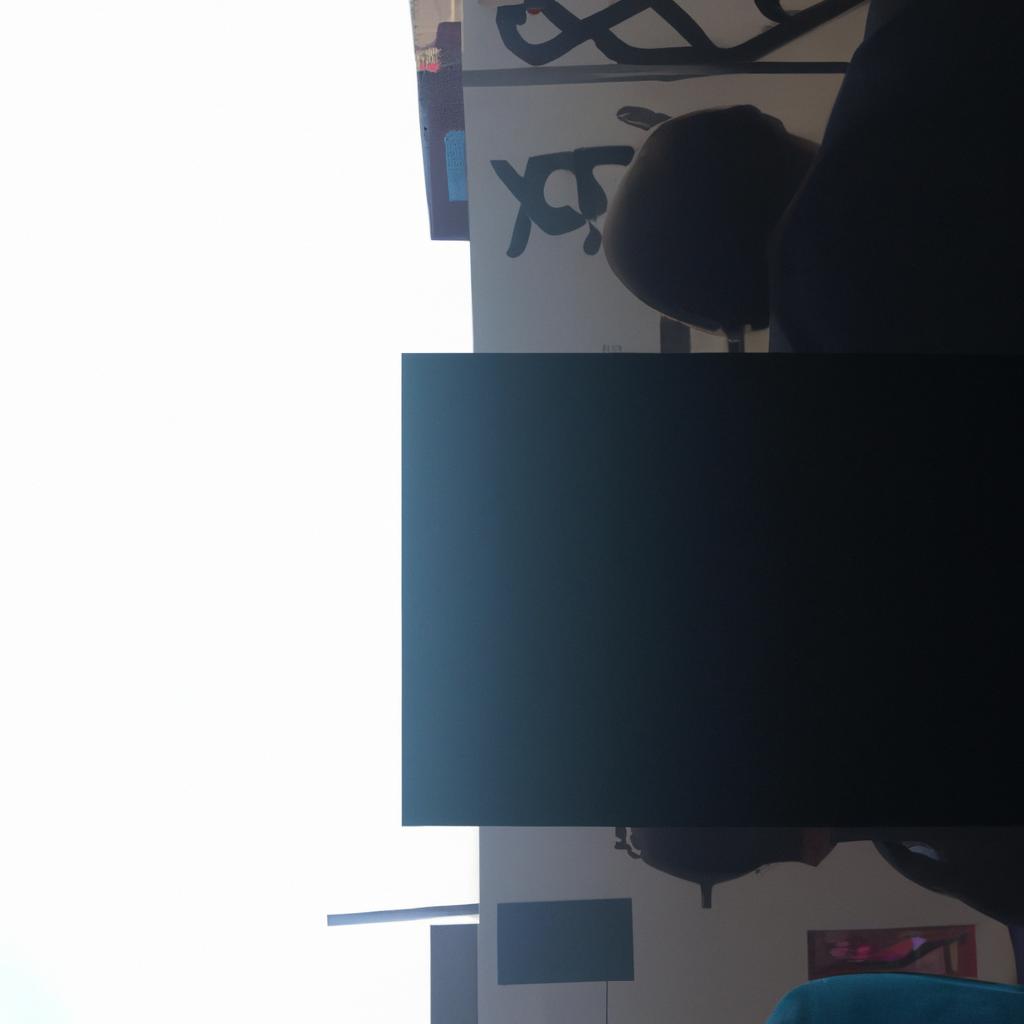The issue of media ownership and its ethical implications has become increasingly relevant in today’s society. The concentration of media power in the hands of a few conglomerates raises concerns about potential biases, conflicts of interest, and the impact on democratic discourse. For instance, consider the hypothetical scenario where a major media corporation acquires multiple news outlets across different regions. This consolidation grants them significant control over the dissemination of information to the public, potentially leading to biased reporting or selective coverage that serves their own interests.
In order to fully comprehend the ethical considerations surrounding media ownership, it is crucial to delve into the complex dynamics within the news media industry. Media organizations have traditionally acted as watchdogs, providing an essential check on those in positions of power. However, when these entities are controlled by a select few individuals or corporations with vested interests beyond journalistic integrity, questions arise regarding impartiality and independence. Such concerns call for a critical examination of how media ownership influences editorial decisions and shapes public opinion, ultimately affecting societal perceptions and democracy itself.
By exploring various case studies and examining the interplay between corporate influence and journalism ethics, this article aims to shed light on the multifaceted nature of media ownership ethics within the news media industry. Through a comprehensive analysis of key issues such as bias bias, conflicts of interest, and the potential for censorship, it becomes apparent that media ownership has far-reaching ethical implications.
One major concern is the potential for bias in reporting. When a single entity or conglomerate controls multiple news outlets, there is a risk that their own political or business interests may influence the framing and presentation of news stories. This can result in a lack of diversity in perspectives and a narrowing of public discourse. Furthermore, if certain viewpoints or narratives are favored over others, it can undermine the democratic ideal of an informed citizenry making decisions based on accurate and unbiased information.
Conflicts of interest also arise when media organizations are owned by corporations with ties to other industries. For example, if a media corporation also owns businesses in sectors such as energy or pharmaceuticals, there may be pressure to avoid critical coverage that could harm those business interests. This compromises journalistic integrity and raises questions about transparency and accountability.
Another aspect to consider is the potential for censorship. In some cases, media owners may exert control over their outlets’ content to align with their own ideologies or protect their personal interests. This can lead to self-censorship among journalists who fear repercussions from owners who prioritize financial gains over objective reporting. Such limitations on freedom of expression threaten the fundamental principles of democracy.
To address these ethical concerns surrounding media ownership, safeguards need to be put in place. Greater transparency about ownership structures and potential conflicts of interest is essential for holding media organizations accountable. Additionally, promoting diversity in media ownership can help ensure a wider range of perspectives and reduce the concentration of power.
Ultimately, society must recognize the vital role that journalism plays in upholding democracy and demand ethical standards in media ownership. By engaging in informed discussions about these issues and supporting independent journalism initiatives, we can work towards a more inclusive and ethically responsible media landscape
Regulatory framework
The ethical considerations surrounding media ownership in the news media industry are often shaped by regulatory frameworks put in place to ensure fair and responsible practices. These regulations aim to strike a balance between protecting freedom of expression and preventing undue concentration of power within the media landscape.
One example that highlights the importance of such regulations is the case of MediaCorp, a major media conglomerate with holdings in television, radio, print, and digital platforms. In 2019, MediaCorp faced allegations of suppressing certain news stories that were critical of its own business interests. This raised concerns about potential conflicts of interest arising from concentrated media ownership and underscored the need for effective regulation.
To address these issues, regulatory bodies have implemented measures aimed at safeguarding journalistic integrity and promoting diversity in media ownership. These measures include:
- Ensuring transparency: Regulators require media companies to disclose their ownership structures, enabling consumers to make informed choices about which sources they trust.
- Preventing monopolies: Restrictions on cross-media ownership help prevent one entity from dominating multiple forms of media, thereby allowing diverse viewpoints to flourish.
- Promoting competition: By fostering an environment where new players can enter the market and compete with established incumbents, regulators encourage innovation and discourage complacency.
- Protecting editorial independence: Regulatory frameworks establish guidelines to protect journalists’ ability to report objectively without interference or censorship.
These regulations serve as important safeguards against potential abuses of power within the news media industry. However, it is crucial to recognize that striking the right balance between regulation and freedom requires ongoing evaluation and adaptation to evolving technological advancements and changing societal dynamics.
Transitioning into the next section about “Conflict of Interest,” it becomes evident that while regulatory frameworks provide a foundation for ethical considerations in media ownership, there are still challenges related to conflicts of interest that must be addressed effectively.
Conflict of interest
Ethical Considerations in Media Ownership: News Media Industry
Regulatory Framework
The regulatory framework plays a crucial role in ensuring ethical considerations are upheld within the news media industry. By establishing guidelines and standards, regulators aim to prevent monopolization of ownership and maintain a diverse range of voices. However, despite these efforts, conflicts of interest can still arise.
One example that highlights the importance of effective regulation is the case of Sinclair Broadcast Group. In 2018, this American telecommunications conglomerate faced scrutiny for its corporate influence over local news stations. Critics argued that Sinclair’s conservative bias was being imposed on local affiliates, compromising their editorial independence and objectivity. This case illustrates how lax regulations can allow media owners to exert undue influence on content, potentially distorting public perception and undermining the integrity of journalism.
To address such concerns, there are several key ethical considerations related to media ownership:
- Transparency: Clear disclosure of ownership interests allows audiences to evaluate potential biases or conflicts.
- Pluralism: Ensuring a variety of viewpoints by promoting competition among different media outlets.
- Editorial Independence: Protecting journalists’ autonomy from undue interference or pressure from owners.
- Public Interest Obligations: Requiring media organizations to prioritize informative and balanced reporting that serves society as a whole.
These considerations should be reflected in regulatory frameworks to safeguard against concentration of power and promote responsible journalism. To illustrate the impact of different approaches, consider the following hypothetical scenario comparing two countries:
| Country A | Country B |
|---|---|
| Few large corporations dominate ownership | Diverse array of independent media entities |
| Limited perspectives presented | Wide range of opinions represented |
| Potential for biased reporting | Greater likelihood for comprehensive coverage |
| Risk of manipulation due to concentrated power | Reduced risk due to decentralization |
In conclusion,
Pluralism and diversity play fundamental roles in fostering an informed society where citizens have access to multiple perspectives. The next section will delve into the importance of media pluralism and its relationship with democratic values, shedding light on how it can counteract concentration of media ownership.
Pluralism and diversity
Transitioning from the previous section on Conflict of Interest, it is crucial to examine how media ownership affects pluralism and diversity within the news media industry. Pluralism refers to the existence of multiple perspectives and voices in the media landscape, while diversity reflects a range of representation across various dimensions such as race, ethnicity, gender, and ideology.
To illustrate this point, let us consider a hypothetical scenario where a single conglomerate owns several major newspapers and television stations in a particular country. This concentration of media ownership could potentially lead to limited access to diverse opinions and viewpoints. With fewer independent outlets available, there is an increased risk that certain narratives may dominate public discourse while alternative or minority voices are marginalized or silenced.
In order to understand the implications further, here are some key considerations regarding pluralism and diversity in media ownership:
- Limited perspectives: When ownership becomes concentrated in the hands of a few powerful entities, it can limit the variety of sources readily available for citizens seeking information. The dominance of specific interests or ideologies may result in biased reporting or selective coverage.
- Homogenized content: Media organizations under common ownership might prioritize profit over editorial independence, leading to standardized content across platforms. This homogenization can stifle innovation and creativity by discouraging experimentation with different formats or topics.
- Underrepresentation: Concentrated media ownership can perpetuate underrepresentation of certain demographics within newsrooms. Limited diversity among journalists can affect story selection, framing, and overall accuracy when covering issues affecting marginalized communities.
- Implications for democracy: A lack of pluralistic media environments undermines democratic processes by limiting access to varied information necessary for informed decision-making. It hampers critical thinking skills among citizens who rely solely on narrow perspectives.
| Considerations | Implications |
|---|---|
| Limited perspectives | Biased reporting; Selective coverage |
| Homogenized content | Standardized news; Lack of innovation |
| Underrepresentation | Marginalized voices; Inaccurate reporting |
| Implications for democracy | Limited access to diverse information; Reduced critical thinking skills |
As media ownership becomes more concentrated, the potential consequences on pluralism and diversity cannot be ignored. The next section will delve into another significant aspect influenced by media ownership: political influence. Understanding this relationship is pivotal in assessing how media can shape public opinion and potentially impact democratic processes.
Transitioning smoothly into the subsequent section about “Political Influence,” it is essential to analyze how media ownership affects the influence exerted by powerful entities within politics and policymaking.
Political influence
Section Title: Political Influence on Media Ownership
Transitioning from the previous section that discussed the importance of pluralism and diversity in media ownership, it is crucial to examine another significant aspect: political influence. This section will explore how political factors can affect media ownership within the news industry.
To illustrate this point, let’s consider a hypothetical scenario where a prominent politician with close ties to a major media conglomerate gains substantial control over multiple news outlets. The politician’s ability to exert influence over these channels raises concerns about journalistic independence and objectivity. Such an occurrence would undoubtedly have far-reaching implications for public trust in the news media and the democratic process as a whole.
Political influence on media ownership can manifest itself in various ways, including:
- Direct or indirect government intervention in shaping media regulations.
- Financial support or preferential treatment given to certain media organizations based on their alignment with specific political ideologies.
- Covert manipulation of content by politically affiliated owners aiming to further their own agenda.
- Pressure on journalists and editors to report favorably towards particular politicians or parties.
This table provides a visual representation of how different forms of political influence can impact media ownership:
| Forms of Political Influence | Impact on Media Ownership |
|---|---|
| Government regulation | Potential limitations on independent voices and stifling of dissenting opinions |
| Financial support | Creation of bias through selective funding leading to skewed reporting |
| Content manipulation | Undermining credibility through biased narratives |
| Journalistic pressure | Compromising editorial integrity resulting in compromised quality |
Examining the potential consequences outlined above highlights the significance of addressing political influence within media ownership frameworks. Striking a balance between freedom of expression and avoiding undue concentration of power remains essential for upholding democratic values.
With an understanding of the complexities surrounding political influence, we now turn our attention to another critical component: journalistic integrity. Understanding how ethical considerations intersect with journalism practices is instrumental in building and maintaining public trust in the news media.
Journalistic integrity
Having examined the potential political influence on media ownership, we now turn our attention to another crucial aspect of ethical considerations in the news media industry – journalistic integrity. To illustrate its significance, let us consider a hypothetical scenario involving a major media conglomerate that owns multiple news outlets.
Journalistic Integrity and Its Challenges:
In an ideal world, journalism is driven by a commitment to truth, accuracy, and impartiality. However, the consolidation of media ownership can present challenges to maintaining these principles. A case study involving a powerful media corporation demonstrates how competing interests within such organizations may compromise journalistic independence.
Example Scenario:
Imagine a large media conglomerate that controls several newspapers and TV stations across the country. This corporation also has significant investments in industries like energy and finance. Now suppose one of their subsidiary newspapers uncovers evidence of environmental wrongdoing by a company in which the parent corporation holds substantial shares. The question arises: Will this newspaper be able to report on the issue objectively without fear of repercussions from its owner?
- Potential erosion of public trust due to compromised journalistic integrity.
- Threats to democracy when media outlets prioritize corporate or political agendas over unbiased reporting.
- Diminished diversity of voices as smaller independent publications struggle against dominant media corporations.
- Undermined ability to hold power accountable when conflicts of interest arise.
Table illustrating Various Ethical Dilemmas:
| Ethical Dilemma | Impact | Consequence |
|---|---|---|
| Conflicts of interest | Compromised objectivity | Biased reporting |
| Lack of editorial independence | Limited diverse views | Narrowed information |
| Corporate agenda-driven | Skewed narratives | Manipulated public opinion |
| Suppression of dissenting voices | Reduced democracy | Limited freedom of speech |
Moving forward, we must address these ethical dilemmas to uphold the values of journalistic integrity and ensure a vibrant and accountable news media landscape.
As we consider the challenges posed by compromised journalistic integrity, it becomes evident that rebuilding public trust and establishing accountability are vital for maintaining an ethically responsible news media industry. Therefore, in the subsequent section, we will delve into the crucial aspects of public trust and accountability within media ownership structures.
Public trust and accountability
Building upon the importance of journalistic integrity, it is crucial to explore how media ownership affects public trust and accountability within the news media industry.
Public Trust and Accountability
One example that highlights the ramifications of compromised public trust due to unethical media ownership can be seen in the case of a major news conglomerate acquiring multiple independent news outlets. Initially, these outlets were known for their unbiased reporting and dedication to factual information. However, after being acquired by the conglomerate, there was a noticeable shift in their editorial direction. The conglomerate’s influence led to biased coverage, favoring certain political ideologies or corporate interests. Consequently, this erosion of trust resulted in decreased confidence among readers/viewers who relied on these previously reliable sources.
To better understand the ethical considerations surrounding media ownership and its impact on public trust and accountability, let us examine some key points:
- Concentration of Power: When a handful of corporations control numerous media outlets, diversity of perspectives may diminish as they tend to reflect similar biases or agendas.
- Manipulation of Information: Media owners with specific vested interests might use their platforms to shape narratives or suppress facts that contradict their agenda.
- Influence over Political Discourse: With substantial resources at their disposal, powerful media owners can exert significant influence over political debates by promoting certain candidates or parties while discrediting others.
- Commercialization vs. Public Service: In pursuit of profit maximization, media organizations under certain ownership structures may prioritize sensationalism and entertainment rather than providing accurate and informative content.
| Ethical Considerations | Impact |
|---|---|
| Concentration of power | Diminished diversity of perspectives |
| Manipulation of information | Suppression of contradictory facts |
| Influence over political discourse | Shaping political debates |
| Commercialization vs. public service | Prioritizing sensationalism over accuracy |
This table illustrates the potential consequences of unethical media ownership practices, emphasizing the need for ethical considerations to safeguard public trust and accountability.
In order to restore and maintain public confidence in the news media industry, it is imperative that regulatory bodies actively address these ethical concerns. Stricter regulations can be implemented to prevent excessive concentration of media ownership and promote diversity of viewpoints. Additionally, transparency measures should be put in place to ensure editorial independence and mitigate hidden agendas within news organizations.
By recognizing the ethical implications of media ownership on public trust and accountability, we can strive towards a more informed society where the dissemination of accurate information takes precedence over any individual or corporate interests.
Remember: Ethical considerations surrounding media ownership are not only vital for maintaining journalistic integrity but also play a pivotal role in preserving public trust and holding those responsible accountable.




